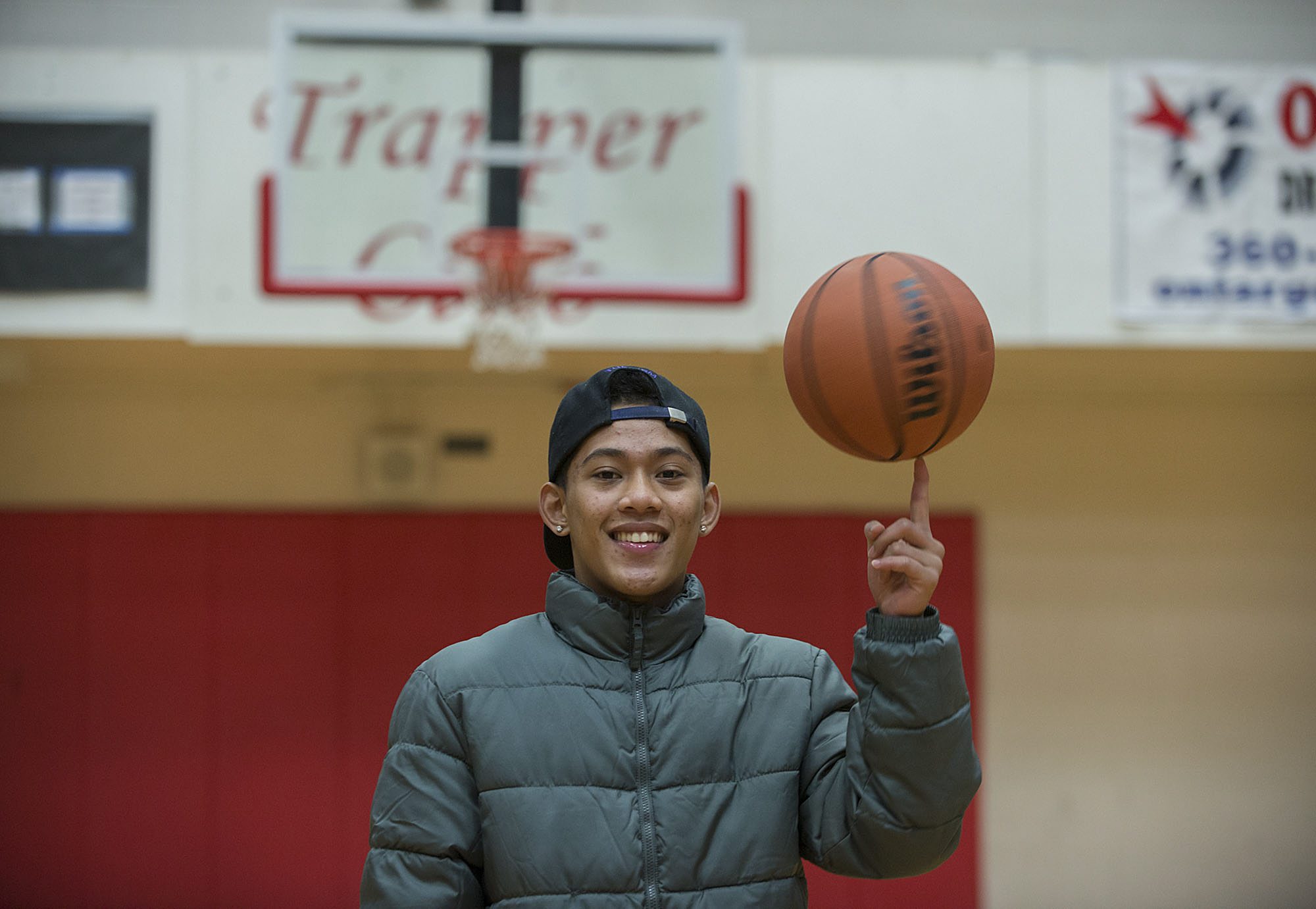Alphin Yosuo spins a basketball on his index finger in the Fort Vancouver High School gym on a December afternoon. The 17-year-old junior plays on the varsity basketball team and hopes to play college ball. Wearing red athletic shoes and a red shirt to show his Trapper school spirit, he seems to be the average American high school student.
But the journey of Alphin, who goes by A.J., has not mirrored that of a typical teenager.
Last school year, he and his family were homeless. They slept on cots on a gym floor among a sea of other families who had nowhere to go.
“It was crowded,” A.J. recalled. “We moved from one homeless shelter to another.”
He lives with his grandparents, two uncles and two nephews. The adults were at work early in the morning, so it was up to A.J. to wake his nephews, ages 8 and 9, and make sure they ate breakfast. Then he walked them to their school bus.
But A.J. didn’t make it to school much.
It wasn’t easy to get to school, he said. The various homeless shelters were far from school. He had to be dropped at school, or sometimes he caught a C-Tran bus and arrived at school around noon — about two hours before the school day ended.
“Last year, I just fell out of school,” he said. “I came to school maybe twice a week. I had Fs.”
But A.J.’s life took a positive turn last summer when his family moved from a homeless shelter into an apartment only a couple of miles from his school. A school bus delivers him to school daily.
First, he rouses his nephews from bed, fixes their breakfast, and makes sure they get dressed for school.
“I’ve set a bad example before, but this year, I’m setting a good example. I tell my nephews to stay in school.”
Born and raised in Honolulu, A.J. is the oldest of six children. At a young age, he started playing basketball and realized he had a knack for the game. Since then, basketball has been his anchor.
“In fifth grade in Hawaii, basketball kept me out of trouble — most of the time,” A.J. smiled. “We’d be good kids on the court.”
Off the court, there were plenty of opportunities to get involved with gangs, drugs and crime. When he was about 10, he remembers noticing “guys in red, blue, ready to fight each other. The Crips, the Bloods. There were guys doing that. Fights every night.”
In the park where they played basketball, “we saw people doing drugs,” he said. “They tried to get us to join them, but we kept playing basketball.”
But in middle school, he skipped school so often that he had to repeat seventh grade. He regrets that.
He had a fresh start in his freshman year. A.J. moved from Honolulu to Vancouver to live with his maternal grandparents, Aichy Anelif and Binasita Eram. He had good grades and played basketball on Fort Vancouver’s junior varsity team. His life seemed to be back on track.
Then his family ended up homeless. Even when A.J. was living in homeless shelters last school year, basketball sustained him. A teen program through Safe Communities Task Force provided positive role models, gang intervention and most essential for A.J., basketball.
“They let us hoop, so I was always there. It kept me out of trouble.”
This school year, after his family settled into an apartment, he wanted to play basketball on the school team again, but his grades were too low.
“I had to get my grades up. Stay in school,” A.J. said. “I got a lot of motivational talks from adults around me. They told me I just had to show up. Our coach (James Ensley) is really serious about being a student before being an athlete.”
He raised his GPA to 2.3. That’s the minimum required for students to play athletics.
A.J. credits many adults who have helped him along the way: his family, coaches, teachers and staff at Fort Vancouver. When his family was homeless, a coach brought his family food. An associate principal gave him C-Tran bus passes so he could ride from the shelter to school at no cost. A teacher helped him research community colleges.
Although his first goal is to play college ball, “Plan B is the Marines,” he said.
Every summer, A.J. returns to Hawaii to visit his mom and siblings.
“When I go back, us islanders play basketball.”
One summer, he was hanging out with his old friends late at night when he was arrested for riding a stolen bike. His friend had given him the bike, but A.J. didn’t know it was stolen. He spent a couple of hours in jail.
“When I came out, my mom was pretty mad,” he said. “There are bad things going on back home with my people,” A.J. said. “They aren’t staying in school. Doing drugs. Stealing. If basketball kept me out of trouble, it can keep them out of trouble. Most of my friends (back in Hawaii) have been in trouble. All that bad stuff going on back home, I want to change that.”
He counts his two uncles as his role models.
“They take care of their family, and that’s pretty much what I want to do. They come to my games. Support me.”
He said his uncle Matrick Eram “is the one who’s supporting us right now. He’s like my dad. My uncle is always telling me: ‘Be somebody. Make a change for our people.’ ”
“The young kids around here tell me: ‘A.J., you’re good in basketball. I want to be like you,’ ” he said. “It kind of touches my heart. It’s not just little kids either. It’s kids here at Fort. They want me to be successful.”
Ensley, the varsity basketball coach, said he noticed A.J. “making really good choices this year. I asked him if he wanted to come back and be part of our basketball program, but first he needed to get his grades up.”
Associate principal Marji Ruzicka helped A.J. get the help he needed: tutoring sessions, online credit recovery, talking closely with his teachers to figure out how to make up missing work.
“He’s a really smart young man. He’s digging himself out of a huge hole, credit-wise,” Ruzicka said. “He’s missed almost a whole year of school, but he went from failing all his classes to having a solid B average within six weeks. Sometimes I’d see him in the school cafeteria at 5:30 or 6 a.m. doing homework before school.”
“He can hoop!” Ensley said. “Basketball is the one place in life where he doesn’t have to deal with a lot of the other stressors and worries. He can just be a kid and have fun. He’s a good kid. I’ve seen him starting to become a really good man.”




